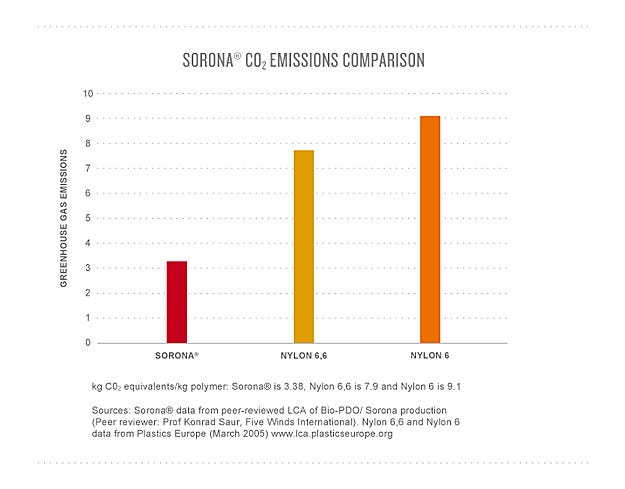At the 10th annual World Bio Markets Conference held in Amsterdam last week, DuPont Industrial Biosciences received the 2015 Bio Business Award for Breakthrough Bio-Based Technology Platform for its sustainably sourced, high-performance fiber, Sorona. Compared to conventional nylon 6, Sorona contains 37% renewable plant-based ingredients, uses 30% less energy and releases 63% fewer greenhouse gas emissions, making Sorona fibers a greener choice with a lower environmental impact.
March 10, 2015
At the 10th annual World Bio Markets Conference held in Amsterdam last week, DuPont Industrial Biosciences received the 2015 Bio Business Award for Breakthrough Bio-Based Technology Platform for its sustainably sourced, high-performance fiber, Sorona. Compared to conventional nylon 6, Sorona contains 37% renewable plant-based ingredients, uses 30% less energy and releases 63% fewer greenhouse gas emissions, making Sorona fibers a greener choice with a lower environmental impact.
Sorona fibers are found in various applications in the textiles industry, ranging from residential and commercial carpets and apparel to automotive mats and carpets. In carpeting, the fibers are valued for their comfort, durability and crush resistance; moreover, carpets made with Sorona are permanently stain resistant from the inside out. In apparel, Sorona is proof that using a sustainable material does not require compromising on performance. In 2014, Vipul Sarees, a leader in the Indian saree market, partnered with DuPont to use Sorona fiber to make soft and colorful sarees in chiffon, georgette, satin and crepe materials that rival the luxurious feel of silk. This partnership provides an alternative for customers seeking quality and performance, while at the same time reducing their use of fossil fuels and carbon footprint.

DuPont has a long history in developing innovative materials that are based on fossil resources--think nylon, Lycra, Kevlar and rayon (the world's first man-made fiber). But recently, the company has focused its scientists and engineers on a new challenge: Creating everyday materials from renewable sources rather than from petroleum.
"As a science company with a long history in the textiles industry, DuPont continues to innovate with technologies like Sorona that allow designers the freedom to be creative without compromising on performance or quality," said Simon Herriott, Business Director for Biomaterials at DuPont.
With the creation of Sorona, DuPont successfully developed a fiber that makes it possible to combine performance and sustainability on an unprecedented level. From renewably sourced monomer production and lower dyeing temperatures to easy care for consumers, the sustainably sourced fiber provides sustainability benefits throughout the value chain.
"With Sorona, everyone benefits. Textile mills, designers and manufacturers can offer consumers sustainable clothing that is supremely wearable, easy to care for and more gentle on the planet," said Herriott.
About the Author(s)
You May Also Like


